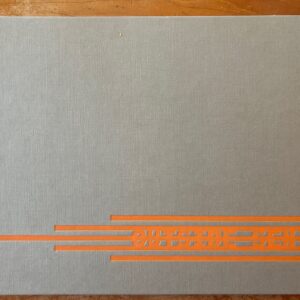JTF (just the facts): A total of 76 photographic works, variously framed and displayed, hung against white walls in a series of connected spaces in both the 533 West 19th Street and 525 West 19th Street galleries.
The following works are included in the show:
- 7 inkjet prints on paper mounted on Dibond aluminum in artist’s frame, 2021, 2022, 2023, sized roughly 83×57 (or the reverse), 84×57 inches (or the reverse), in editions of 1+1AP
- 10 inkjet prints on paper mounted on aluminum in artist’s frame, 2022, 2023, sized roughly 23×30 (or the reverse), 25×30, 31×24, 28×37, 31×38, 32×42, 43×36 inches, in editions of 3+1AP
- 19 inkjet prints on paper, clips, 2015, 2017, 2019, 2022, 2023, sized roughly 108×161, 133×89, 82×54 (or the reverse), 82×55 inches, in editions of 1+1AP
- 13 inkjet prints on paper, 2015, 2016, 2020, 2022, 2023, sized 12×16 inches (or the reverse), in editions of 10+1AP
- 4 chromogenic prints, acrylic glass, wood, 2023, sized roughly 26×22, 25×21 inches, unique
- 1 chromogenic print, acrylic glass wood diptych, 2020-2023, each sized roughly 25×21 inches, unique
- 1 chromogenic print mounted on Dibond Aluminum in artist’s frame, 2022, sized roughly 84×57 inches, in an edition of 1+1AP
- 15 chromogenic prints, 2016, 2018, 2021, 2022, 2023, sized 24×20, 16×12 (or the reverse), 6×4 (or the reverse) inches, unique
- 2 color photocopies, 2023, sized roughly 12×17 (or the reverse) inches, unique
- 4 offset prints, 2018, 2020, 2021, sized roughly 12×9, 11×8 inches, unique
- 1 single-channel video, 2023, color, silent, 5 minutes 14 seconds, in an edition of 3+1AP
(Installation shots below.)
Comments/Context: Coming out of his energizing 2022 retrospective at MoMA (reviewed here), it might have been natural for Wolfgang Tillmans to pause, reflect, and perhaps take a short breather before moving onto his next artistic project. But as seen in this gallery survey of work largely made in the past year or two, Tillmans doesn’t seem to have slowed down at all; in fact, he seems to have continued to restlessly bounce around the globe, actively following interests in half a dozen or more approaches to making photographs that reflect his layered vantage point on life in the 21st century.
What emerges is “more of the same”, in the best sense of that phrase. While Tillmans doesn’t offer any bold new directions in these pictures, he continues to refine each sub-genre of his practice, continually adapting to the changing conditions he experiences in the far flung locations that make up his art world existence. If there is any thread that ties these recent photographs (and one video) together, it feels like a conscious leaning into understated intimacy. There is more calmness here than ever before, his observations lingering with a sense of patient (and confident) deliberateness, almost regardless of the place or moment in which he may find himself.
In the past, Tillmans’s aerials have generally felt vast and epic in scale, the bigness of his cities extending out for miles in their almost unfathomable immensity. And while Tillmans’s new images taken from airplanes, or at least from elevated perspectives, do indeed document the density of city lights in Abidjan, the snow-covered contrasts of city and mountain in Provo, Utah, and the built complexity of New York city overpasses and warehouses, there is a strong sense of Tillmans being there and looking closely at these things; his aerials don’t feel anonymous, but somehow personal, if only in the acknowledgment of the wonders and astonishments flying past his airplane window. Other aerials feel even more intimate, from a puff of power station smoke seen poking through the clouds to the all-over white textures of a snowy scene in South Dakota. Down on the ground, the same can be said of a misty bank of encroaching clouds in the Faroe Islands and a glance upward at the eerily orange wildfire smoke recently seen in New York City – Tillmans is mediating massive scale with individual engagement, seeing wider forces and natural vistas with sensitivity and open curiosity.
As Tillmans moves through various cities, his eye is repeatedly being caught by the interplay of architecture and nature, where the hard edges of the built environment are uneasily combined with leafy greenery and unruly growth. Several compositions use windows to frame views of plants, branches, and leaf shadows, mixing squared off geometries with overlapped natural curves and colors. Other pictures use walls and buildings as backdrops or contrasts, for a spindly tree fighting for its life against a pre-fab concrete wall and a gathering of graceful poppy pods reaching for the sky. When Tillmans does venture inside, he notices the patterns of sinks in a factory and the piping and insulation on the ceiling of a gym, or slows down even further to see the way the light filters through a sheet covering a window or creates another layer of geometries across interior walls. In each case, Tillmans seems drawn to moments of softening, where unwelcoming impersonal rigidity is overcome by elegantly simple (and often overlooked) intrusion.
When people become the central subject in Tillmans’s photographs, whether in more formal portraits or as more serendipitous street discoveries, a similar kind of attentiveness is being deployed by the artist. While a number of straightforward portraits of various artists and activists in comfortable surroundings have been included here, few feel entirely memorable, aside from an image of the artist Anita Esfandiari standing next to some pink cabinets and a jaunty self-portrait nude seen reflected in a window; all of the portraits are thoughtfully seen, but there isn’t much compositional magic taking place in most of them. Images of a floral photo shoot in Golden Gate Park, a nude sunbather on striped towel, a friend stretching upside down, and a jumble of fallen boxes on a sidewalk in Shenzen all feature much more complexity and nuance, giving the peopled scenes more friction and energy.
Tillmans has long been a master of the unexpected still life, and this show features plenty of standout examples, some of them printed at monumental scale. An arrangement of bruised tropical fruits and plastic bags is a knockout, as is another images of a browned leaf that has broken apart into folded triangles. Tillmans revels in the tactile qualities of stacked papers, a threadbare hanging shirt, the rumpled bunching of a pair of green pants left on the floor, and a yellow rubber boot covered in sticky mud, seeing sensual qualities in the humblest of subjects. And he has fun with flattened spatial arrangement in works featuring three legs and feet, a gathering of blue bottled water caps, and a selection of sprouting potatoes.
If the still lifes feel muted and meditative, the new “Lighters” (from an ongoing series) are even more pensively inward, turning all the way to complete abstraction. Housed in plexiglas boxes, the works explore the object quality of printed photographs, with gentle color fields, gradients, folds, and angles becoming the subject. Similarly mystical are various views of the cosmos, including a full moon, a misty partial eclipse, and a massive image of the lunar surface that looks like a sparkling mass of water. And a mesmerizing video work captures “the scintillation of Sirius through a defocused telescope”, which Tillmans has reimagined as a quick moving feed of colorful cosmic stills in differing sizes, which shifts and shimmers as it shuffles through the enveloping darkness of space.
So if there is an overarching mood or theme to this Tillmans gallery show, it feels like continuation and consolidation. There are few frictions overtly wrestled with here, and less political, environmental, and societal concerns being raised and championed than in previous shows. Coming out of the constraints and challenges of the pandemic, perhaps Tillmans is enjoying a short period of relative personal optimism, where he can examine his own perspectives and observations of the world more closely. And while his photography is undeniably flourishing, it seems likely that this sophisticated calm won’t last forever, and he will once again turn to subjects with more urgency and incisive bite.
Collector’s POV: The works in this show range in price from $12000 to $225000, based on size, with many images available in multiple sizes and many works already sold at this point in the show’s run. Tillmans’s work is routinely available in the secondary markets, and top end prices (particularly for his abstract images) have risen sharply in the past several years. Overall, recent prices for his prints have ranged between roughly $2000 and $795000.















































